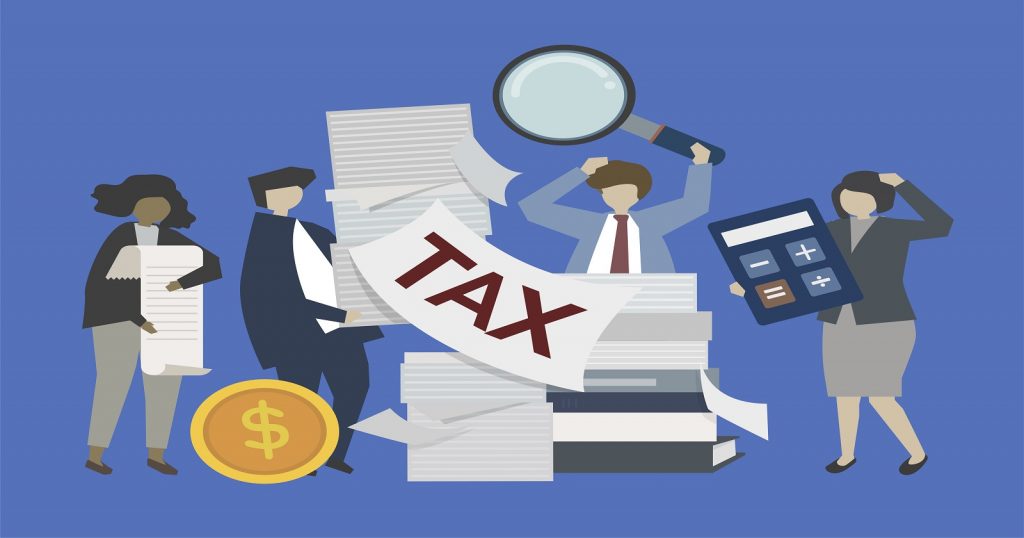The IRS offers numerous tax breaks for small businesses, but understanding what you can deduct (and how to do it properly) isn’t always straightforward.
That’s why we’ve compiled this list of 23 small business tax deductions you can use. From basic write-offs to lesser-known tax breaks, we’ll show you how to spot and claim the small business tax deductions you deserve.
Understanding Small Business Tax Deductions
Let’s begin by defining small business tax deductions. Claiming a tax deduction reduces the income your business is taxed on.
Here’s a simple way to think about it: If your business made $80,000 last year and claims $20,000 in tax deductions, you’ll only pay taxes on $60,000.
Tax deductions work differently from tax credits. While a deduction lowers your taxable income, a credit directly reduces your tax bill.
For example, a $1,000 tax deduction might save you $200 if you’re in the 20% tax bracket. But a $1,000 tax credit cuts your tax bill by the full $1,000.
For the IRS to accept your small business tax deductions, they must be both “ordinary and necessary” for your trade or business. “Ordinary” means it’s common in your industry—like buying flour for a bakery. “Necessary” means it helps you run your business—like paying for accounting software.
Keep in mind that you’ll need records to back up your deductions. Save receipts, invoices, and bank statements. Organized records make tax filing easier and protects you if the IRS questions your deductions during a tax return review.
Keep this tax deduction cheat sheet handy when reviewing your business expenses; it’ll help you identify which costs your small business qualifies for.
Now that we understand how small business tax deductions work, let’s look at the most common expenses you can write off.
Essential Operating Expense Deductions
Running a business involves many day-to-day costs. These small business tax deductions form the foundation of most tax-saving strategies.
1. Cost of Goods Sold
This essential small business tax deduction lets you deduct the cost of products you sell to customers. This includes raw materials, finished products, storage, and shipping expenses.
For instance, a coffee shop owner can deduct the cost of coffee beans, cups, and other supplies needed to make drinks. In another example, a bookstore can deduct the wholesale price of books plus shipping fees to get them to the store.
2. Business Insurance
Insurance premiums represent a significant small business tax deduction that many overlook. Several types of business insurance premiums include:
- Liability insurance to protect against customer injuries or claims
- Professional liability insurance for service-based businesses
- Property insurance
- Workers’ compensation insurance
- Business interruption insurance
- Cyber liability insurance
It’s worth mentioning that personal insurance, such as life or disability insurance, isn’t deductible even if you’re a business owner. If you prepay insurance for multiple years, only a portion of the current year’s portion is eligible for a small business tax deduction.
3. Office Expenses
Your everyday business supplies and equipment qualify for tax deductions. This includes office furniture, cleaning supplies, break room supplies, papers, pens, computers, and more.
For expensive equipment that lasts more than a year, you might need to spread the small business tax deduction over several years to account for depreciation. However, many small businesses can deduct up to $5,000 in equipment costs immediately using Section 179 expensing.
You May Also Like:
Property-Related Deductions
Documenting where you conduct business is crucial for claiming property-related deductions. Business owners can claim expenses related to the use, maintenance, and depreciation of business property, resulting in a significant small business tax deduction.
4. Home Office Deduction
You can deduct some of your housing costs if you use part of your home regularly and exclusively for business. The key word here is “exclusively.” A desk in your living room doesn’t count, but a spare bedroom used only for work does.
Your home office expenses and home office deduction include a percentage of your property taxes and interest paid on your mortgage. You can calculate this deduction in two ways:
- The Simple Method: Deduct $5 per square foot of your office space, up to 300 square feet.
- The Regular Method: Calculate the percentage of your home used for business, then apply that percentage to actual expenses like mortgage interest, utilities, repairs, and depreciation.
5. Business Property Rent
Rent payments for any property you use for business purposes are fully deductible. If you prepay rent, you can only deduct the amount that applies to the current tax year.
You’ll need to calculate and deduct only the business portion for spaces used partly for business and partly for personal use.
6. Utilities and Internet
Many utilities are eligible for a small business tax deduction when using your premises for business.
For home-based businesses, calculate the percentage used for business versus personal use. If your home office takes up 20% of your home, you can deduct 20% of your utility bills.
For cell phones and internet expenses, estimate the portion used for business and keep records to support your calculation. Be prepared to show personal and business use percentages.
You May Also Like:
Employee and Professional Service Deductions
The costs of working with others — whether employees or freelancers— can substantially reduce your tax burden.
7. Payroll Taxes
As an employer, you can deduct your share of employee payroll taxes. This includes:
- Social Security taxes (6.2% of wages)
- Medicare taxes (1.45% of wages)
- Federal unemployment taxes
- State unemployment taxes
The employee’s share of these taxes isn’t deductible since it comes from their wages. However, any matching contributions you make to employee retirement plans are deductible business expenses.
8. Professional Fees
Professional services often represent substantial small business tax deductions. You can write off fees paid to professionals who help run your business, including legal fees, IT support fees, business consultant fees, and more.
Keep detailed invoices showing the services these professionals provided. Personal legal matters, even if they affect your business, typically aren’t deductible.
9. Employee Benefits
The IRS allows deductions for employee benefits. This includes health insurance premiums, life insurance coverage, disability insurance, retirement plan contributions, dental and vision plans, childcare assistance, and more.
If you’re self-employed, you can deduct 100% of your health insurance premiums as an income adjustment rather than a business expense.
You May Also Like:
Travel and Transportation Deductions
Business mobility comes with deductible expenses. Understanding what qualifies can help maximize your travel-related small business tax deductions.
10. Business Travel Expenses
The IRS allows deductions for business trips that take you away from your tax home (your regular work location). You can deduct:
- Airfare, train tickets, or bus fare
- Hotel costs
- Local transportation like taxis or rideshares
- 50% of your meal costs while traveling
- Baggage fees
- Dry cleaning during trips
- Business calls and internet charges
- Tips to hotel staff and drivers
These trips must have a clear business purpose to qualify for a small business tax deduction. Attending a trade show or professional conference and meeting clients are examples of business travel expenses.
But extending your stay for sightseeing? Those extra days aren’t deductible.
11. Vehicle Expenses
Are you using your car for business? The IRS offers two ways to claim this small business tax deduction for the use of your vehicle:
- Standard Mileage Rate: Track your business miles and multiply by the IRS rate (67 cents per mile for 2024). This covers gas, insurance, repairs, and depreciation all in one.
- Actual Expenses: Add up all your car expenses—gas, insurance, repairs, depreciation—and multiply by the percentage of business use. If you drive 5,000 miles total and 2,000 are for business, you can deduct 40% of your car expenses.
Whether you choose standard mileage or actual expenses, use this tax deduction cheat sheet to track the right information throughout the tax year. Remember to track trips between work locations, client visits, and supply runs. However, your regular commute to work isn’t deductible.
Financial and Banking Deductions
Managing your money comes with costs. Most financial services fees related to business operations are tax-deductible.
12. Interest Payments
Interest charges on business loans and credit cards are tax-deductible. This includes:
- Bank loan interest
- Line of credit interest
- Business credit card interest
- Equipment financing charges
- Real estate loan interest for business property
- Vehicle loan interest (based on business-use percentage)
It’s worth mentioning, however, that personal credit card interest isn’t deductible, even if you use it for business purchases. Keep business and personal credit separate to make the most of this deduction.
You May Also Like:
13. Bank Fees
Yes, you can deduct those recurring bank charges. However, it’s advisable not to use personal bank accounts for business purposes.
If you have a separate business account (which you should), these fees are fully deductible. So, keep good records of these bank charges on your monthly statements.
Marketing and Business Development
Understanding which marketing and promotional expenses qualify for small business tax deductions can help you reduce your taxable income.
14. Advertising and Promotion
Marketing and promotional materials can help attract customers; some of these costs qualify for small business tax deductions.
They include digital ads on social media and search engines, website costs and maintenance, business cards and brochures, email marketing services, print ads, trade show booth fees, and more.
15. Business Meals
The rules for meal deductions have changed recently. Here’s what you need to know:
- Business meals with clients or prospects are 50% deductible.
- Employee meals during business travel are 50% deductible.
- Office snacks and drinks for employees are 100% deductible.
- Company-wide parties or picnics are 100% deductible.
- Meals provided for employee convenience (like working late) are 50% deductible.
For tax deduction on the business meals, keep records of who attended, the business purpose, the date and location, and the amount spent.
You May Also Like:
Government and Regulatory Expenses
Compliance with government regulations is a necessary part of running a business. While these costs are unavoidable, many of them qualify for tax deductions.
16. Local Business Licenses and Permits
You’d be happy to know that government-required fees to operate your business are tax-deductible. Common deductible permits and licenses include:
- Annual business operation licenses
- Environmental compliance permits
- Health and safety inspection fees
- Industry-specific certifications
- Professional practice permits
- Zoning and land use permits
Multi-state businesses should track jurisdictional requirements separately as each state and local government may have different fee structures and renewal periods for small business tax deductions.
17. Foreign Business Compliance
When conducting business internationally, you can deduct costs associated with overseas operations. This includes registration fees in foreign jurisdictions, document translation expenses, international tax ID registrations, and required local business registrations.
Use the exchange rate from the date each expense occurred for currency conversions. Some countries offer reciprocal tax treaties, which may affect how you claim the small business tax deduction.
Research and Professional Development
Investing in your business’s future through research and professional growth is essential to qualify for a small business deduction. The IRS recognizes these investments through specific tax deductions designed to encourage business innovation and professional advancement.
18. Research and Development Costs
Small businesses developing or improving new products can benefit from R&D deductions. Qualifying expenses for a small business tax deduction include:
- Product testing fees
- Technical staff wages
- Patent development costs
- Research facility expenses
- Prototype development costs
- Testing equipment and materials
The IRS offers special tax credits and deductions for qualifying research activities, particularly in the technology and manufacturing sectors.
19. Professional Organization Memberships
Industry associations and professional groups often provide valuable business connections and resources. Beyond basic membership fees, you can deduct:
- Conference registration costs
- Mandatory continuing education
- Industry certification renewals
- Professional journal subscriptions
- Networking event fees
Focus on organizations directly related to your industry or business function. General business groups may face higher scrutiny from the IRS and may not be eligible for a small business tax deduction.
Specialized Deductions
These specialized small business tax deductions help offset expenses that don’t fit traditional categories.
20. Startup Costs
The IRS lets you deduct up to $5,000 of the startup expenses in your first year. You can also deduct costs over $5,000 gradually over 15 years. Just keep detailed records of everything you spend before opening day.
21. Education and Training
Professional certification courses, business workshops, and seminars count as small business tax deductions to help offset your professional development costs. If you’re improving your business skills through education, ensure these trainings align with your current business.
Advanced Deductions
Some small business tax deductions require more detailed documentation. However complex, don’t overlook these advanced tax-saving opportunities;
22. Charitable Contributions
Business donations are different from personal ones and some charitable contributions are eligible for small business tax deductions. Here’s what you can deduct:
- Cash donations to qualified charities
- Product donations (at cost value)
- Equipment donations
- Sponsorships of charitable events
- Use of your business space for charitable events
Meanwhile, suppose you get something in return (like advertising at a charity event). In that case, only the amount above the value you received is eligible for a small business tax deduction.
You May Also Like:
23. Depreciation
Large purchases don’t have to be deducted all at once. You have several options:
- Section 179: Deduct up to $1,160,000 (2024 limit) of equipment costs immediately.
- Bonus Depreciation: Deduct 80% of qualifying property costs in the first year.
- Regular Depreciation: Spread the deduction over several years based on IRS schedules.
This applies to things like machinery and equipment, office furniture, computers, vehicles used for business, and some business building improvements.
Tax Forms for Different Business Structures
Different business structures have specific tax forms for claiming a small business tax deduction. Here’s a breakdown of which forms to use based on your business type.
Sole Proprietors
Use Schedule C (Form 1040) to report business income and expenses. It typically looks like this:
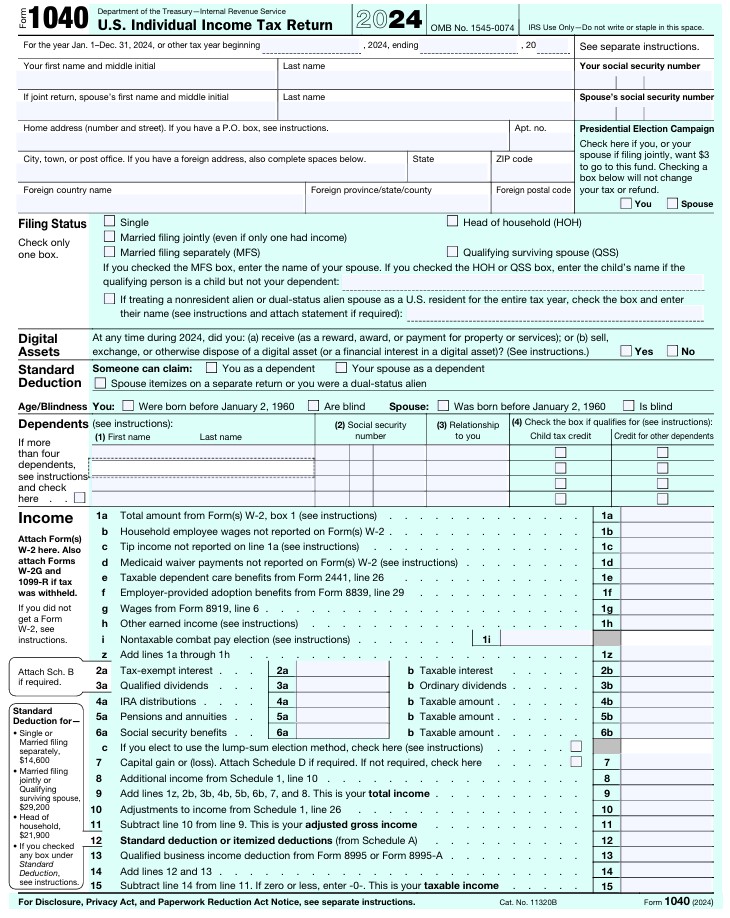
Image via IRS
List small business tax deductions in categories like advertising, car and truck expenses, insurance, office expenses, and travel and meals.
You’ll attach this list to your personal tax return. Home office deductions go on Form 8829.
Partnerships
File Form 1065 for the business, but partners report their share of expenses on Schedule K-1. Here’s the Form 1065:
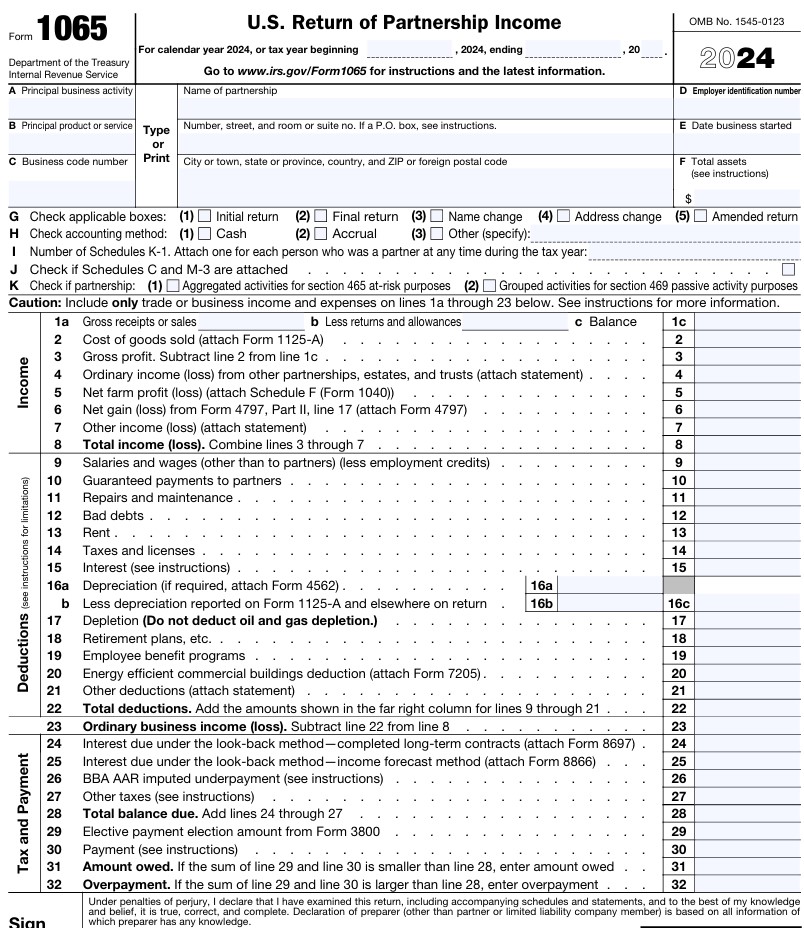
Image via IRS
Business deductions reduce the partnership’s income before it goes through to individual partners. Each partner can also deduct their unreimbursed partnership expenses on Schedule E.
S-Corporations
Report deductions on Form 1120-S. It looks like this:
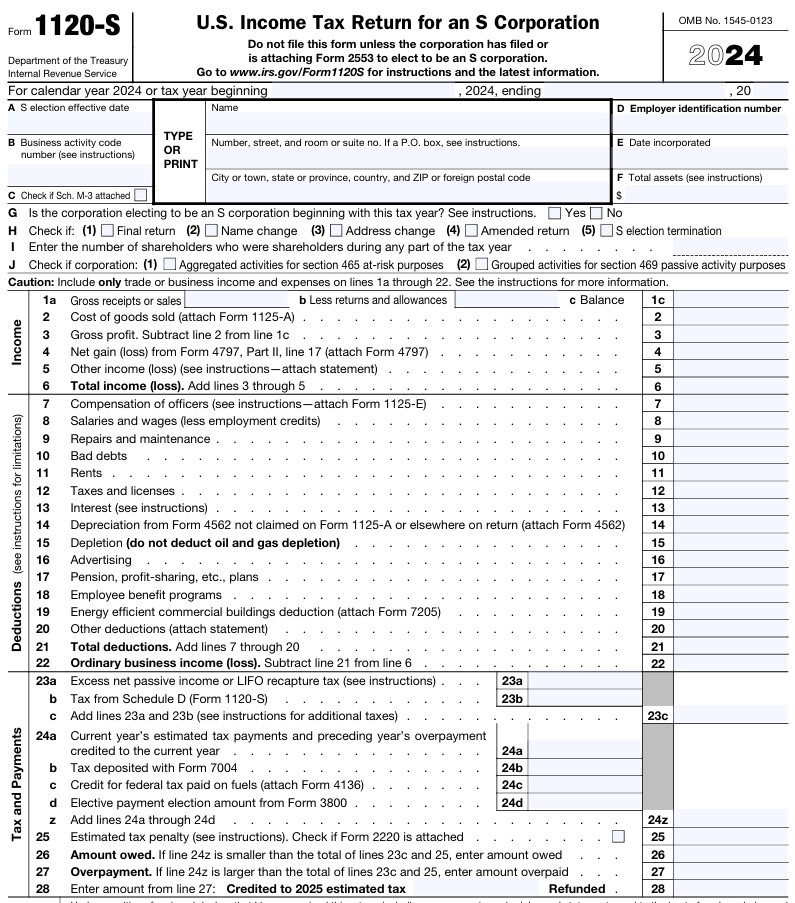
Image via IRS
The corporation deducts business expenses before distributing profits to shareholders. Shareholders who pay business expenses personally can get reimbursed by the corporation or deduct them as unreimbursed employee expenses.
C-Corporations
List all deductions on Form 1120.
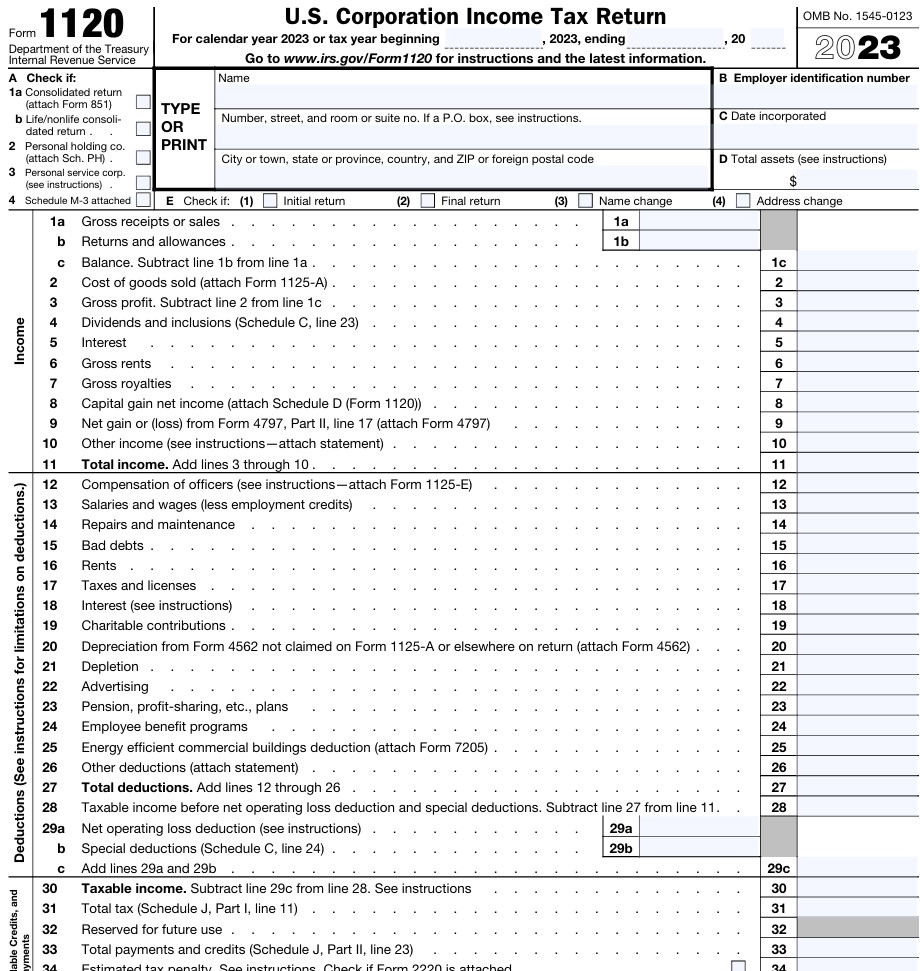
Image via IRS
Unlike other business types, C corporations deduct all expenses at the corporate level. Shareholders can’t claim personal deductions for corporate costs unless they’re reimbursed by the corporation.
LLCs
Tax treatment depends on how your LLC is classified:
- Single-member LLCs use Schedule C
- Multi-member LLCs file as partnerships
- LLCs can also elect S or C-corporation status
Follow the rules for whichever tax status you’ve chosen. Regardless of your business structure, this tax deduction cheat sheet can help you identify which form to use for your small business tax deduction.
You May Also Like:
FAQ
1. How much do most small businesses pay in taxes?
Tax rates vary based on your business structure. Sole proprietors pay self-employment tax (15.3%) plus income tax on profits. Corporation tax rates start at 21%. Most small businesses pay between 20% and 30% of their profits in federal taxes. Your rate depends on income level, deductions, credits, and state taxes.
2. How much do you have to make as a small business to claim taxes?
You must file a tax return if your business earns $400 or more in net profit. You may still qualify for refundable tax credits even if you earn less. Plus, reporting losses now could help offset future profits. The IRS also looks at filing history when reviewing businesses.
3. Can I deduct my home office if I only use it part-time for business?
Part-time use is fine, but exclusive use is required. This means the space must be used only for business, even if you work only a few hours daily. A corner of your bedroom with a desk won’t qualify, but a dedicated room you use only for work will—even if you use it just three hours daily.
4. Are startup costs tax deductible before I make my first sale?
Yes, you can deduct up to $5,000 in startup costs in your first year of business. These include expenses like market research, employee training, and location scouting that you incur before opening. Keep track of all pre-opening expenses, even if you’re not sure they’ll qualify.
5. Do I need to keep physical receipts, or are digital copies acceptable?”
The IRS accepts digital copies of receipts and supporting documents as long as they’re legible and contain all required information: amount, date, vendor name, and description. Many businesses use receipt-scanning apps or accounting software to store digital copies. However, some highly scrutinized deductions, like vehicle expenses and meal costs, may benefit from additional physical documentation.
6. What records do I need to keep for vehicle expense deductions?
Keep a log showing each trip’s date, miles driven, and business purpose. Record starting and ending mileage for business trips. Save receipts for gas, repairs, and insurance if you’re claiming actual expenses instead of the standard mileage rate. Most tax pros recommend a mileage-tracking app.
7. What is the 20% tax deduction for small businesses?
This is the Qualified Business Income (QBI) deduction. It lets most self-employed and small business owners deduct 20% of their business income. Not everyone qualifies; there are income limits, and some service businesses face restrictions. However, it’s a significant small business tax deduction on top of regular deductions.
8. What happens if I claim a tax deduction and later find out it wasn’t eligible?
If you discover an error in your claimed deductions, you can file an amended return to correct it. The IRS generally appreciates voluntary corrections. You may need to pay additional tax plus interest, but by self-correcting, you’re less likely to face penalties than if the IRS discovers the error during an audit.
You May Also Like:
Summing Up
Each small business tax deduction you claim is money back in your pocket. Start tracking these expenses now; don’t wait until tax time.
Set up a simple system to record expenses and save receipts throughout the year. While this guide covers major small business tax deductions, tax laws change often.
Working with a tax professional can help ensure you claim all the deductions you deserve while staying within IRS rules. Keep this tax deduction cheat sheet as a reference throughout the year to make tax season easier. Good luck!


